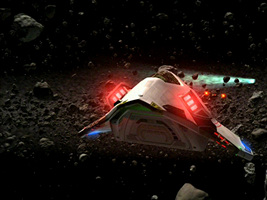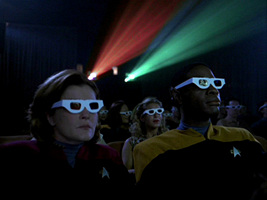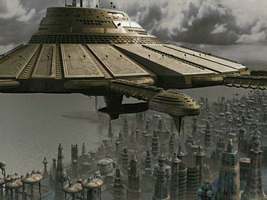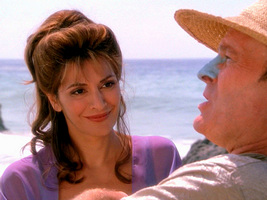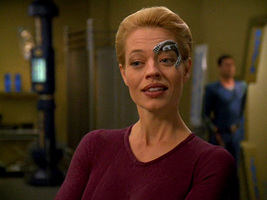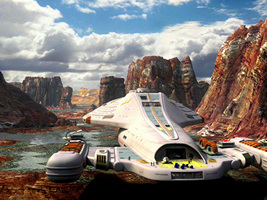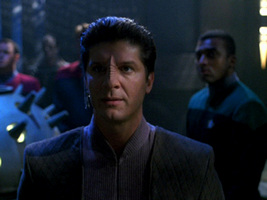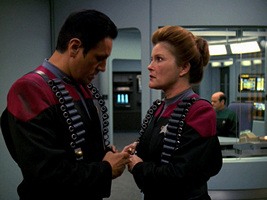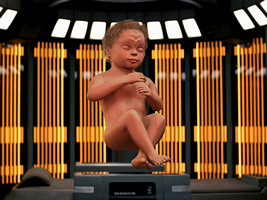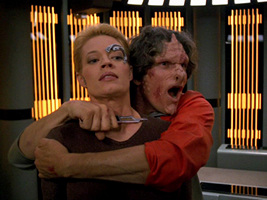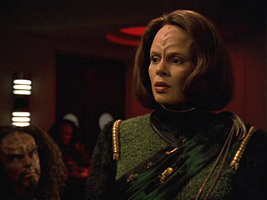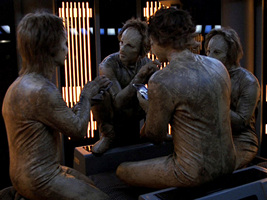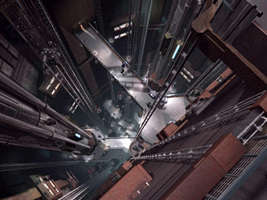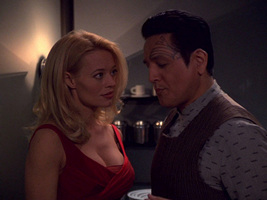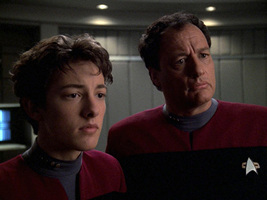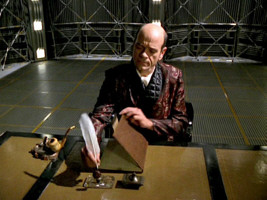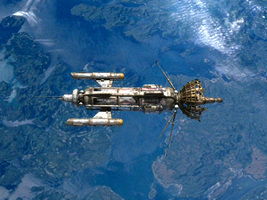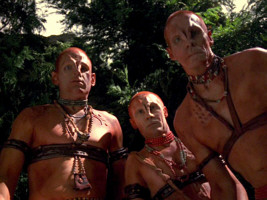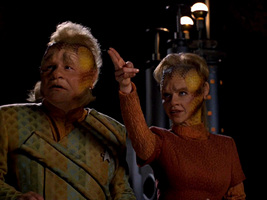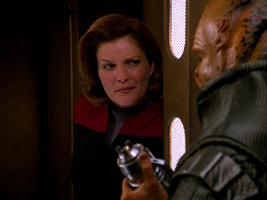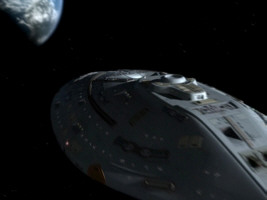Star Trek Voyager (VOY) Season 7
Season 1Season 2Season 3Season 4Season 5Season 6Season 7
Imperfection
DriveRepression
Critical CareInside Man
Body and Soul
NightingaleFlesh and Blood I/II
ShatteredLineage
RepentanceProphecy
The VoidWorkforce I/IIHuman ErrorQ2Author, Author
Friendship OneNatural LawHomesteadRenaissance ManEndgame
Unimatrix Zero II
See VOY season 6
Imperfection
Synopsis
Stardate 54038.4: After Mezoti and the Borg twins have left the ship, Seven suffers from malfunctions in her cortical that which will inevitably lead to her death, unless a new node for her can be found. When simulated attempts to replace it with a salvaged device from a dead drone fail, she submits to her fate. Icheb believes he could survive without his cortical node which he offers to Seven, but she rejects because this could put him in danger. When Icheb spontaneously deactivates his node, a fast decision is necessary. The Doctor performs the transplantation and manages to save both lives.
Commentary
It's a simple story, it's a touching story, it's one of those stories that show us the essence of Star Trek behind all the superficial technobabble and special effects. In fact, the above episode outline dealing with cortical nodes and surgical procedures only tells the mere facts. The true story is about Seven, who only slowly recognizes how her friends, namely Janeway, the Doctor, Neelix, even B'Elanna, and most of all her pupil Icheb care for her far beyond their duties. Seven suffered from a severe illness before in "Infinite Regress", but her schizophrenia prevented her from reflecting about it. In contrast, she is fully aware of her situation in "Imperfection", while she is obviously not aware that she is not alone with her pain and fear. Of all crew members B'Elanna is the one to tell her that people will miss Seven, and not only because of her versatile abilities. Icheb, finally, has to force her to accept the help she herself would probably have granted to anyone else on board. Seven is too much thinking in terms of "earning" and "deserving" something. The Borg know only one virtue, efficiency, and if this is not given any longer in a drone, it is simply deactivated. While we may speculate that drones don't have anything like fear of death, Seven definitely doesn't want to die like that. Maybe she sees the experience of facing her death as her final trial on her way to become human. Fortunately she survives this exam and may profit from it. I guess Seven was not the only one with a tear in her eye (remember Data in "Generations"?) at the end of the episode, but several viewers on the other side of the screen too.
Unfortunately, the time for the episode couldn't have been worse. It's a bad idea that only one week after the Delta Flyer has been blown to pieces and even much more Borg debris has been generated in "Unimatrix Zero" there is a new Flyer ready for use, and they are again going for Borg debris. The reason is that "Imperfection" was actually planned for two weeks later. The stardates were changed accordingly when it was moved, but the new Delta Flyer will be still "officially" introduced in "Drive". In "Imperfection" there was at least a small remark that it had been destroyed, but where the new debris comes from remains unanswered. It should have been mentioned that this could have been one of the cubes blown up by the Queen and not just another Borg vessel accidentally destroyed in an ion storm. Furthermore, even the discussion about Janeway's wish to go on the mission alone was much the same as last time. A very bad continuity flaw is that Seven asks B'Elanna about afterlife, and no reference to "Barge of the Dead" is made by any of the two.
Annotations
- Remarkable dialogue: (a tear rolls down Seven's cheek) "Seven, your ocular implant is malfunctioning again." (Icheb) - "Actually, it's functioning perfectly." (Doctor)
- Remarkable fact: A list of casualties with Ensign Marie Kaplan, Ensign Lindsay Ballard (who is not really dead), Crewman Timothy Lang (whom I don't remember) and several more names still to be deciphered is shown.
- Remarkable VFX: The surgery was very nicely done. I can't tell if it was a dummy in which the cortical node was inserted, or if the scene was digital combination of a real scene with Jeri Ryan and the node.
- Remarkable ship: The monster hunter ship from "Bliss" was reused for the marauder ship.
- Distance to Earth: 30,000 ly
Rating: 7
Drive
Synopsis
Stardate 54096.6: Tom and Harry, in the new Delta Flyer, engage in an spontaneous shuttle race with the lovely Irina who tells them of a big race that is to take place between former war enemies of the region. Tom, excited about participating, cancels a romantic weekend with B'Elanna. She is sad about that but finally decides to join him as his co-pilot. After Irina's co-pilot Jaxom has been injured, Harry takes his place. He soon learns that Irina does everything not to win the race. The reason is that she sabotaged the Delta Flyer so that all the vessels near the finish line would be destroyed in an antimatter explosion. Harry manages to warn the Flyer, and just before they dump the warp core, Tom proposes marriage to B'Elanna which she accepts.
Commentary
Now that I have seen it, I wonder why no one has come up with the idea of a shuttle race in Star Trek before. Although the race itself gradually lost its importance, both to the terrorist story and to Tom's and B'Elanna's love story, it is definitely one of the coolest new ideas lately, and a custom-tailored motive for Tom. I was pleased to see that Tom's immediate friends, namely B'Elanna and Harry, were both strongly involved too, and most other crew members contributed only little bits to the story centered on them.
Well, while Tom and Harry were totally in character, I didn't recognize the new B'Elanna at first. She was so understanding, so calm, so reflective all the time. Maybe it was thanks to Tuvok's mental training, or because of her recent Borg experience. The most obvious reason, however, is that in Tom's love she has finally found something she wants to preserve at all cost, more than her duty as a crew member and more than her reputation as an engineer. She was never really excited about the shuttle race, but thought it would strengthen their relationship if she joined Tom. Interestingly, it was Seven as the probably least experienced person in relationships who gave her the tip, and one week after their talk about death and afterlife it is one more sign that they have finally become friends. It was out of obstinacy that Tom stopped the Delta Flyer briefly before reaching the finish line, but in a way he returned B'Elanna's favor of forgoing one's interests for the benefit of a beloved person. Yet, this is just goodwill, but not what love is really about, and Tom and B'Elanna gradually recognize that. Ironically, while they still agree that Harry and Irina would fit together much better, the two latter are struggling for the control of a weapon. Love has no simple rules, there is nothing like a perfect couple, and there is no need that both partners have to share all their interests and agree about everything - except for the one question that B'Elanna answered with "yes". The situation of the marriage proposal reminded me of "Day of Honor" where it required an emergency too, until B'Elanna finally admitted that she loved Tom.
Annotations
- Nitpicking:
- How could the Delta Flyer come to a full stop, unless Tom used something like a brake? How can any starship stop anyway, without a second impulse drive in the ship's bow?
- Why were there so many planets and anomalies within only a few million kilometers?
- There were several familiar starship designs that shouldn't have been around, most blatantly the Karemma ship, and scaled-down versions of the Akritirian cruiser, a Monean ship and a Devore ship in the shuttle race.
- One thing that horrified me was that there were Terellians once again as one team in the race. It obviously wasn't enough that this is (in its various spellings and slight permutations) the most popular name for different races in the Alpha Quadrant by far, throughout all of TNG and most notably in Voyager's fifth season. Whoever has this "T-race" obsession should see his psychiatrist - and get an Encyclopedia so that he will be able to make up really new names where appropriate.
- The name "Irina" for an alien woman isn't a good idea either. The authors should finally recognize that fictional names should express something and are not just interchangeable at will.
- Remarkable dialogue: "Will you marry me?" - "Warp core breach in 15 seconds." - "You're proposing now?" - "It's as good a time as any." (Tom, the shuttle computer and B'Elanna)
- Remarkable VFX: The episode had several nice shots of the shuttle race, but the two small ships in Voyager's shuttlebay was the most convincing effect. I only wonder how Irina's very wide ship could pass the shuttlebay door, if already the Delta Flyer just clears the opening. Oops!
- Photon torpedoes used: 1
Rating: 6
Repression
Synopsis
Stardate 54167.4: Tuvok investigates a mysterious series of attacks on former Maquis members on Voyager, which leaves them unconscious for several hours. To everyone's surprise, Tuvok himself turns out to be the attacker. He received a subconscious message from Teero, a fanatic Bajoran Maquis in the Alpha Quadrant. It is noticed too late that Teero, who had conditioned Tuvok's mind already when he was covertly collaborating with the Maquis, forced Tuvok to perform mind melds with the Maquis, thereby spreading a message to take over the ship. Chakotay, given a keyword by Tuvok, starts a mutiny. Tuvok, however, has overcome his condition in the meantime, and he manages to bring back Chakotay through another mind meld.
Commentary
It was a summit of Bajoran vs. Vulcan mental forces and an intelligent idea to bring up the old Maquis spirit again that had unfortunately vanished after only one season on the Federation ship. The episode comes much too late to make up for the failure though. I liked the overall idea, and the episode definitely has its merits. The way the story took and the acting, however, was only routine. I would have expected more fascinating revelations and especially a more elaborate ending. After all the complications it was just too easy that Tuvok spontaneously recovered from his state of mind and could heal Chakotay too through yet another mind meld. The episode had the most good scenes for Tuvok in quite a while, but as a character study this "Lt. Tuvok and Mr. Hyde" didn't even come close to "Riddles" where both the script and Tim Russ were great. I also missed the thrill when first everyone on the ship (or at least the Maquis) had to fear to fall victim to the unknown attacker and later the Maquis took over the ship. There should have been more about it than crew members running around with phaser rifles. Well, the tension was there, but the characters, and not only Tuvok, looked much more aggressive than anxious from the very beginning when the first victim, the Bajoran named Tabor, was found. Not only from the part of the Maquis crewman who said he didn't trust Tuvok (without having been attacked), but also between Tuvok, Chakotay and Janeway there was an unusual and premature dissonance.
Continuity has never been a virtue of Voyager, but here the errors are especially annoying, since the Maquis guest actors and extras played comparably important roles. It was never explicitly stated how many crew members were on the Maquis ship. Now we get figures for the first time, and they seem way too high. As the Bolian said, almost a quarter of Voyager's crew are former Maquis. This would amount to about 35. Taking into account the death toll (in the first three seasons they seemed to die just like redshirts in TOS), there should have been close to 50 on the tiny Maquis ship. Chakotay's statement after having assumed command that there are still 23 comrades not with the mutineers confirms that, since about a dozen had been attacked by Tuvok. At least, there was intra-episode continuity. If we accept the Maquis crew count, where do they all suddenly come from? Were they assembling shuttlecraft on deck eleven all the time, together with Lt. Carey, Samantha Wildman and the Equinox crew? We may have to accept that there are several more humans, a few Bolians and, in particular, yet another Bajoran Maquis we have never seen before (after the one in "Nothing Human"). But how in the world can we explain another Vulcan crew member (the female in red uniform), considering that all Vulcans, namely Tuvok and Vorik, had to hide in "Counterpoint"? If she was aboard in "Blood Fever", she might have, well, hmm... It all makes no sense. Oh well, one positive remark: they managed to get two human crew members in one episode, Yossa and Jor, with non-English names!
Annotations
- Remarkable quotes:
- "Let me get this straight. You've gone through all this trouble to program a three-dimensional environment that projects a two-dimensional image and now you're asking me to wear these to make it look three-dimensional again?" (B'Elanna about Tom's red-green 3D glasses)
- "Pagh'tem'far. B'tanay." ("This is a holy time. A time of awakening.")
- Distance to Earth: 35,000 ly (Did they travel back 5,000 ly since two weeks ago?)
Rating: 3
Critical Care
Synopsis
Stardate not given: A man called Gar kidnaps the Doctor and sells him to a hospital on an alien planet. While Voyager is trying to track down Gar, the Doctor learns that the hospital is controlled by a computer, the Allocator, that decides about the treatment of the patients depending on their assessed value for the society. The Doctor smuggles redundant cytoglobin from the privileged "Level Blue" to "Level Red" where the medicine is urgently needed. When his covert actions are exposed, he infects the bureaucrat Chellick with a virus to force him to change the medicine allocation policy.
Commentary
I liked the idea of "Critical Care" (to use the Doctor as a doctor) much better than previous "holonapping" plots, such as "Future's End" or the pointless "Concerning Flight". Medical treatment in the hospital depends on the social status of a person. That may seem unjust and inhumane, but for an overpopulated planet with scarce resources there may be no other way. After all, Chellick had quite convincing arguments that it was necessary. The Doctor was centered on helping here an now, and he definitely couldn't survey the whole economy of the planet, let alone devise a plan to change it. His medicine smuggle was made simple and was definitely moral because the privileged patients on Level Blue really didn't need the cytoglobin. I wonder what he had done if the patients on Level Blue had been ill too, and if he had been to decide whether to heal few patients for sure or whether to equally distribute the scarce cytoglobin to all of Level Red so there would not be enough for everyone. Without this problem, it was easy for the Doctor to play the planet's "savior".
I first thought it was only a harmless injection he gave to Chellick to force him to change the system, just like Neelix tortured Gar's stomach to obtain the required information. But the virus was real, and the Doctor's later bad conscience about that (when he had Seven check his ethical subroutines) was the deserved consequence. For better or worse, once again he quite obviously exceeded his original programming.
Some aspects of the story are still not clear to me. Tebbis, the boy who helped the Doctor, died all too suddenly. Well, I don't think that someone consciously killed him, but I wonder what these complications of his illness were about. Maybe the cytoglobin has bad side effects, or the Doctor even made a mistake when treating the boy. I would have liked to see that further elucidated. Dr. Dysek, the Chief of Medicine of Level Blue, remains a mystery. He seems to be both competent and conforming to the system's rules at the beginning, just the kind of doctor who drives a Porsche and forgets the hospital while playing golf. I wonder if he really didn't know that he had to keep his medicine quota constant - for every employee of a university institute knows that two weeks before Christmas the rest of the budget has to be spent for something like yet another computer so that it won't be reduced in the following year. It is a surprise that in the end, when Dysek has finally understood how the system used to work, he supports the Doctor. Regarding Chellick, I don't think that he is really the bad guy here. He's just a bureaucrat who feels obliged to fulfill his duty and nothing beyond that. He probably didn't invent the system of medicine distribution, and I wonder if he alone is able to change it and if he even wants to change it once the Doctor has left.
Sadly, levels of medical treatment on our own planet are similar, considering that teenies in wealthy countries get nose corrections or breast enlargements for birthday, whereas in the Third World even the most important medicine to treat infections is missing. The fact that it doesn't all happen in the same hospital doesn't mean that it should be simply accepted.
Annotations
- Nitpicking:
- When the Doctor is automatically transferred from one point of Level Blue to another, he is wearing the mobile emitter. Would they beam him for a few meters each time? I doubt that.
- According to Tuvok, Voyager purchased iridium from Gar, which is supposed to have a very brief half-life. For once they mention a real element, but they get it wrong, because iridium is not radioactive.
- Remarkable scene: When Gar's love interest is jealous that Janeway is after him, Janeway grabs Tuvok's hand, telling her that she already has someone. :-)
- Remarkable fact: The 20th century sports revival continues. This time it is ice hockey (with a Nausicaan guard, how unpleasant).
- Remarkable VFX: The alien planet and the hovering hospital were done by Eden, a new company. They were very nicely done, but to me it all seemed too brown and dirty.
Rating: 6
Inside Man
Synopsis
Stardate not given: The Ferengi intercept the transmission of a hologram of Barclay, alter it, and transmit it to Voyager. Their intention is to get hold of Seven's Borg nanoprobes to sell them. The crew of Voyager, save the Doctor, is unsuspicious about the fake hologram that is luring them directly into a trap. Meanwhile, on Earth, Barclay and Deanna uncover the Ferengi's plan and fake a message of the fake hologram. The Barclay hologram takes Seven into an escape pod, but they can be beamed out, and only the pod makes it through the geodesic fold the Ferengi have created to the Alpha Quadrant.
Commentary
"Inside Man" is very heterogeneous, with many different characters and places. I think this is a weak point about it, because it is detrimental to the advancement of the plot. It is always a pleasure to see Reginald Barclay (for the fourth time in this series) and Deanna Troi (for the third time). Well, I'm lacking definite arguments, but my impression is that "Pathfinder" and "Life Line" that concentrated on one place, the Alpha Quadrant, worked out better. There are a few nice plot twists in "Inside Man", but it never gets really exciting because the narrative is sidetracked too often. One particular example is that, just after the Ferengi discuss the value of Seven's nanoprobes, the scene changes to Deanna's beach resort (on Risa?) where she and Barclay have a much too long conversation. Another one is when the Barclay hologram entertains the crew speaking with Janeway's voice. They should have shown this scene before telling the viewer that this is the "evil" hologram - also considering that he uses the same trick later to deceive the crew. I liked these scenes, but they were a bit displaced just as everything was too episodic.
What I enjoyed more than the actual plot was the countless tidbits for fans. I have never seen so many of them in a Voyager episode. First of all, it was great to see the Ferengi again, and they acted just as one can expect it. Even their ship was correctly classified as "D'Kora-class Marauder". It's good to see that this consistency of seemingly unimportant things is not simply thrown overboard like so often before. Children learn about Delta Quadrant races like the Talaxians or the Ocampa at school. There is an allusion to Deanna's chocolate addiction, Deanna says that Barclay sang a duet with Data on Geordi's birthday party (I just try to imagine that), and Riker is mentioned to arrive at the resort later - if he chose the place, it's absolutely certain that it's Risa. ;-) Will and Deanna later decide to spend their vacation in Tiburon - unfortunately this doesn't seem to be a reference to TOS: "The Way to Eden", but rather to a small town near San Francisco. B'Elanna and Tom fool Harry with their "Iconian scientist" (TNG: "Contagion") who has allegedly found a way to open a transdimensional gateway. Harry is truly gullible, considering that the Iconians were extinguished many millennia ago. The Carolina is said to reach the Ferengi at a distance of 0.7 light years in 2 hours. That makes sense, since it's about 3000c which equals Warp 9.9 - so it's a fast ship. Finally, someone seems to have learned how to use a pocket calculator!
Annotations
- Nitpicking:
- Unfortunately there was some avoidable scientific crap in the episode. The term geodesy stands for planetary cartography and, in a more figurative meaning, geodesics are "straight" lines in curved space. So what is the "geodesic radiation" technobabble supposed to mean, if not simply gravitation (radiation)?
- It's plain annoying that, once again, there is an inoculation against radiation. For those among the writers, producers and advisors who still don't understand it, radiation damages the body when being absorbed, whereas inoculation can only fight bacteria or viruses.
- And one more thing they obviously never learn is that transferring something from one's own storage device to another one is "uploading" and not "downloading". They urgently need internet access to see the difference, and to get feedback from fans who know it better.
- Remarkable quotes:
- "Voyager has Borg interquadrental warp drives and Hirogen-hunting sensors and Vidiian phage torpedoes." (Barclay, in the transmission to the Ferengi - a homage to Riker's nonsensical "firomactal drive" explanation in TNG: "Rascals")
- "Uh, I, uh... I wouldn't want to be a third nacelle." (Barclay about joining Troi and Riker for dinner)
- Current crew count: 150, according to Harry
- Distance to Earth: 30,000 ly (How did they travel the 5,000 ly since two weeks ago?)
Rating: 6
Body and Soul
Synopsis
Stardate 54238.3: The Lokirrim attack the Delta Flyer and attempt to delete the Doctor, because they think he is a "photonic insurgent", a participant of a revolt of holographic people. The Doctor hides his program in Seven's implants and takes control of her body. With his/her charming personality Doctor/Seven quickly gains the confidence of the Lokirrim crew, especially of the male commander, Ranek, who has a crush on Seven, and the female Jaryn whom the Doctor likes quite a bit. Doctor/Seven manages to send a distress call to Voyager. After helping Ranek, who has been injured, they leave Lokirrim space in peace.
Commentary
This is not the first character crossover and not one of the most original ones either. At times, everything was close to becoming silly, and in spite of all the good reviews I had read before I could finally watch the episode I already feared it could turn out as a second "Profit and Lace". This fortunately didn't come true (I hate cross-dressing as a concept of humor and this alone, aside from the dumb plot makes the DS9 episode awful). Anyway, the Doctor's joy of having a real body, and especially his culinary and alcoholic pleasures to Seven's disadvantage were mostly very amusing, but also distracting. The main focus should have been on their attempts to escape, and the humor should have been restricted to a few scenes, otherwise the authors had better let the crossover take place in a quite different plot and an environment with no imminent danger.
While it was overall just an average episode, it profited from fine acting. Jeri Ryan was convincing as Doctor/Seven and she managed to reproduce all his typical mannerisms from his nonchalant talking and gestures to his sometimes bittersweet facial expressions. Maybe, as paradoxical it may seem, Seven was never as seductive as while the Doctor was controlling her date with Ranek! I liked the Lokirrim. They were somehow credible as people who were caught in a war they don't want and they don't understand. Cruel villains or people fanatically fighting wouldn't have been the suited opponents here. Especially Jaryn and Ranek were cute, and they made fine counterparts for the Doctor and Seven, respectively.
Annotations
- Nitpicking: For some reason holding cells always seem to have blind spots and no sign of audio or video surveillance, but this general logical problem was especially annoying here when the imprisoned crew members were so loud discussing their situation that the whole ship should have heard them.
- Remarkable scene: Doctor/Seven demonstrates that the replicator serves peaceful purposes by replicating a slice of New York cheese cake and offers it to Ranek. When he/she has to prove that it's not poisoned, he/she notices the great taste, and Ranek has to get another piece.
- Remarkable fact: After seven years on the ship, Tuvok finally enters his pon farr, which Tom Paris declares a "Tarkalean flu".
Rating: 5
Nightingale
Synopsis
Stardate 54274.7: While Voyager is landed on a planet for maintenance, Harry, Seven and Neelix are on a supply mission in the Delta Flyer. They defend an alleged medical transport of the Kraylor that is under attack from Annari warships. Harry finds only lower ranks of the crew and some scientists alive, and they ask him to assume command to safely return to the Kraylor homeworld that is under siege by the Annari and needs the medical supplies. Harry calls the ship "Nightingale", after Florence Nightingale. It later turns out that the Kraylor scientists aboard have actually developed a new form of cloak to hide from the Annari and the ship is their prototype. After Harry has been released of command, he later returns, and together with the crew manages to take the ship through the Annari blockade.
Commentary
Harry is the man! Nobody aboard the alien ship understands their own technology, but Starfleet Wunderkind Harry needs only a few seconds to repair their propulsion system (and he probably cleans up the bridge and teaches his attentive Kraylor audience Starfleet protocols in a few hours too). The whole episode starts with these implausible abilities, and is unfortunately based on them. I wonder what really makes a good captain - technical skills, fast reaction in a crisis, knowledge of regulations or rather the general ability to lead people? Harry definitely possesses the first and probably the second quality. As for the rest, Seven is right that captains have to delegate and to trust their inferiors instead of trying to do everything themselves. I wonder what Starfleet protocols are useful for a short-term mission on an alien ship anyway, and why the Kraylor so easily trust in his leadership, knowing him for only a few hours. This is especially questionable if we take into account that they are not telling the truth, and Harry may notice it any time, so why do they take the risk of him becoming yet another enemy or at least a critical voice among them? Moreover, the scientists obviously know well how to operate the cloaking device; why don't they try to familiarize themselves with the other ship systems too? So their obvious reaction should have been: "Thanks for your help. Good-bye." A bit too little for an episode. But even with the "Captain Kim" theme "Nightingale" was nothing special, and it was also a bit reminiscent of last week's "Body and Soul" where another not-so-bad and handicapped opponent relied on the miraculous abilities and the mercy of Starfleet likewise.
The secondary plot with Icheb, who thinks that B'Elanna is attracted to him, is quite amusing but doesn't have much potential, so I was glad that it didn't play a great role. On the other hand, I would have expected to see a more elaborate ending or something like a punchline to his brief crush instead of his rather serious discussion with B'Elanna. She neither giggled nor seemed embarrassed when he had left engineering, one of which reaction I firmly expected.
Annotations
- Nitpicking:
- One thing I just don't understand is that Harry reappears with the prototype ship outside the Kraylor homeworld in the end. Didn't they take any effort to get the ship there, to build more like them? How could they suddenly escape so simply? This just doesn't make sense, as well as the fact that Harry obviously agreed to take the ship to the Kraylor homeworld in the first place, although he would have to cross the defense perimeter even twice.
- Another oddity is that Voyager has to follow the Annari with impulse only, because they insist on leaving at once, and when they reach the border, they are obviously still at impulse. Is the border coincidentally only a few million kilometers away so that they can get there in a matter of hours or at most a few days?
- Remarkable quote: "You've made all the customary overtures: finding reasons to spend time with me, complimenting me, inviting me to engage in recreational activities. Your husband even challenged me to a ritual contest." (Icheb about B'Elanna's alleged advances and to Tom's proposal to engage in a car race)
- Remarkable VFX scene: The exterior view of Voyager landed on the planet looked great. Unfortunately there was no close view of people working on the hull, which would have emphasized the impression of a real, big ship.
- Remarkable ship: They probably couldn't find any less suited ship than the Federation fighter to use as the Nightingale. Agreed, they added many small windows to suggest it's at least 200m long, but the characteristic structure was still exactly the same. The Annari ships, on the other hand, were very nicely done (although they are only slightly redressed Ramuran vessels).
- Remarkable fact: Voyager lost "over a dozen crew members" when the ship was pulled into the Delta Quadrant, according to Harry. This is the first definite number about it, and it matches with my previous guesses.
- Ship landing: #6
Rating: 3
Flesh and Blood I/II
Synopsis
Stardate 54337.5: Voyager finds a Hirogen space station with a training environment where all hunters have been slaughtered by their holographic prey. The only survivor is a technician called Donik. It turns out that the Hirogen have altered the holotechnology they received from Voyager to create sentient prey in the form of several Alpha Quadrant species. Now, under the leadership of the Bajoran Iden, the holograms are revolting and they are trying to free holograms created by other species too. When Janeway is about to deactivate the renegade holograms, the Doctor, who feels that they are fighting for a good cause, beams over to their ship. They also abduct B'Elanna who, together with the holographic Cardassian woman Kejal, is supposed to fix their permanent holoemitter. Iden soon exhibits signs of megalomania, and when he kills Nuu'Bari miners to "free" three unintelligible holographic workers the Doctor turns against him. In a showdown on the Y-Class planet Ha'Dara, where the holograms are hunting the Hirogen hunters, the Doctor disables Iden whose program gets lost. Before the battered Hirogen crews return to their ships, Janeway reaches an agreement that the holograms, together with Donik, are free to leave.
Commentary
I was skeptical at first because I anticipated that it would be just another opportunity to show as many Alpha Quadrant species as possible, as a pseudo-continuity for those who expect more familiar Star Trek from Voyager. Moreover I'm not fond of the idea that Hirogen are spread across tens of thousands of light years (why didn't Janeway try to get their propulsion technology?) and I think that one sentient hologram, namely the Doctor, is enough without stressing the credibility of the concept too much. Nevertheless, it turned out the most enthralling episode of the season so far and I really enjoyed it. There was also a lot of CGI effects which, unlike it is so often the case, were not wasted to show just another space anomaly. The continuity to "The Killing Game" and "Body and Soul" was so convincing that I wonder why they don't pick up old stories or themes much more often instead of the usual "trouble of the week" that is quite similar as many things Voyager encountered before, but nonetheless has nothing to do with it.
The Doctor was the main character in the episode, and he made an awful mistake. I understand that he felt solidarity with the holograms, especially after seeing that they really suffered from their injuries. Nevertheless, especially since the Doctor is supposed to be familiar with maniacal behavior, he should have noticed much earlier that "Moses" Iden's motivation was more than just being the savior of his suppressed people, even before he voluntarily beamed over to their ship. Moreover, the Doctor knows about the war that is going on between the Lokirrim and their holograms since "Body and Soul", and he knows of the Lokirrim's fear of holograms which must have a reason. Does he think that of all holograms who are revolting the leader and initiator should be a person he can trust - more than he trusts Janeway?
There were a few logical problems that unfortunately cumulated towards the implausible end. Iden had 34 hunters beamed down to Ha'dara. Maybe the holograms killed most of them so only the five in Voyager's transporter room were left in the end, but this can hardly have been the complete crews of the two huge ships. Janeway's remark, "...but with so few hunters..." suggests exactly this, though. And what about Neelix's suggestion, "The question is, which story will it be - the one about the dying beta whose life had to be saved by a hologram, or will it be the tale of the beta who bravely took over the hunt, killed the holograms, and destroyed their ship?" In the ears of the Hirogen this would almost sound as if Neelix were really suggesting to continue with the hunt. With all the holograms except for one being disabled, it would have been quite easy, even for damaged ships. The whole ending seems much too rash and too forced. Considering that the holograms and the Hirogen might (want to) encounter each other again, the conflict is only postponed, even if Janeway thinks it has been solved.
I liked several details. The Doctor, for instance, asked for a shuttle to fly to a conference, but Chakotay denied the request with the argument that Voyager wouldn't be able to wait for him. This is much more credible than the many detours that were made in previous episodes without any important reason. Also, for once, we see a convincingly large holodeck. An interesting detail is that the rocks inside the Hirogen holostation look like styrofoam, as if they had not put a lot of effort in recreating them (as opposed to the prey).
The Hirogen technician Donik is quite different from the hunters and adds cultural diversity to the Hirogen. A civilization of hunters only wouldn't be credible anyway. Like B'Elanna said, in another context, "It may be the warriors who get the glory but it's the engineers who build societies."
I also liked when Voyager suddenly left the blind spot behind the big Hirogen ship and fired. That's what I call a surprise attack! A tactic that I didn't like at all was the old "feedback loop" trick. Do the writers think we don't notice that they come up with it twice a season, or are they so obsessed with it (like with Antares and the T-Races) that they don't notice themselves?
Annotations
- Continuity: The planet Ha'Dara is Y-Class ("Demon Class").
- Remarkable quote: "You killed two living beings to liberate mindless machines!" (Torres)
- Remarkable ships:
- The Hirogen station was new, but it reminded me too much of other stations we have seen before, like the one of Species 8472 in "In the Flesh" (as the whole opening scenes with the Alpha Quadrant scenario inside the station were a bit reminiscent).
- The hologram ship was the second new ship, with several typical Hirogen design features, but overall rounder (probably for better distinction from the other Hirogen vessels).
- The huge Hirogen hunter ship, finally, (some 1100m long) was a bit disappointing, since it didn't seem to consist of anything besides scaled and differently arranged components of the smaller Hirogen ship.
- The Nuu'Bari freighter was just a re-use of the good old TNG triangular ship which had been seen in as the Numiri patrol ship for the last time.
- Photon torpedoes used: 4
Rating: 7
Shattered
Synopsis
Stardate not given: Voyager runs into an anomaly that splits the ship into 37 time frames, from the departure to the Badlands to seventeen years into the future. Only Chakotay, after getting a chroniton hypospray, is able to cross the barriers between the time frames. Although Captain Janeway of 2371 first mistrusts him, he can convince her to help him get the ship into temporal sync again. With the support of future Naomi and Icheb, Maquis B'Elanna, and Seven of Nine when she was a Borg they gain control of engineering that is occupied by Seska and the Kazon, to initiate a warp pulse. Back in his time, seconds before the ship encounters the anomaly, Chakotay is the only one to remember what happened, and he prevents the accident from happening again.
Commentary
Where "Relativity" was great and the first re-issue "Fury" wound up as an almost total failure, "Shattered" is just the third take on basically the same plot concept. The episode has some cute ideas and for fans it is a nice résumé of seven years of Voyager, but it fails to convince because of its lack of thrill and its bad plot logic, as if the producers had learned nothing from "Fury". I don't know if even the author has an idea if and how the ship can be split up into different time frames in different places, while every slice of the ship is perfectly intact and has full power. This lack of logic is further discussed in my time travel section.
If we leave aside the whole logic discussion, up to some point it was interesting to see what's going on in the ship at different times, but it never really got exciting. Chakotay just had a walk through time, first alone and than together with Kathy "The Bun" Janeway who is both skeptical and curious about her ship's future. The merit of the episode and what makes it worth four points is in the many details. Janeway mentions her helmsman (Lt. Stadi from "Caretaker"), we see Naomi and Icheb again, even in two different time frames, Seska has another appearance, and Dr. Chaotica is about to conquer his holographic universe again (with the security protocols disabled, as usual ;-)). In addition, Janeway has disassembled her worst enemy, the replicator. It is interesting how this and Naomi's puzzle reflect the state the ship will be in.
Annotations
- Nitpicking:
- "Voyager doesn't have an astrometrics lab." Huh? Well, in "Year of Hell" the impression was created that it was all brand new, and after all, the set was actually brand new. But how in the world can a ship of the Intrepid class, a dedicated explorer with extraordinary scientific equipment, be without an astrometric lab (or stellar cartography or whatever it could be called)?
- Another annoyance is that, after the already common inoculation against radiation, now there is one against the time!
- Remarkable quotes:
- "Once, a long time ago, I called this replicator a 'glorified toaster.' It never forgave me." (Janeway)
- "Eighth? Everyone knows there are only five dimensions!" (Dr. Chaotica, fantastic in-joke!)
- Remarkable prop: Naomi's LCARS puzzle (soon in the toy shops?)
Rating: 4
Lineage
Synopsis
Stardate 54452.6: B'Elanna is pregnant. While to Tom and everyone else on board everything seems fine, she is plagued by childhood memories when she was teased by her human relatives. B'Elanna does everything to persuade the Doctor to alter her daughter's genes so that she wouldn't look like a Klingon - for alleged medical reasons. When neither he nor Tom agree, she tampers with the Doctor's program so that he would perform the genetic resequencing. Just before the procedure is about to begin, Tom can finally convince her that it is wrong and that he will definitely love his daughter the way she will look. The fear that Tom may leave her just like B'Elanna's father left one day was actually B'Elanna's subconscious concern.
Commentary
Just for a change, "Lineage" didn't have any anomalies, any new aliens or any technical problems, and the story didn't even need a secondary plot like that because it would have only distracted from B'Elanna's character study. The episode is definitely something that wouldn't have been possible in the first few seasons, and it shows there has been a lot of character development, unlike what is frequently criticized about the show. Yet, in the fifth and sixth season the attempts to show new facets of B'Elanna mostly failed, so writing "Lineage" for her rather unloved character must have been a challenge.
What B'Elanna attempted to do is very objectionable, and I still don't understand her true motivation, and why, in the end, she learned so quickly that it was wrong. Didn't Tom always make very clear that he loved mother and child as they are or would be, respectively? Didn't he and everyone else assure B'Elanna of their full support now and in the future? B'Elanna actually couldn't expect a better start for her child's life than amidst her new family on Voyager (well, except for the attacks on the ship every few weeks). But it wasn't any rational motivation, anything that B'Elanna, the engineer, would have been able to understand and repair. It was a deeply buried feeling of guilt from her childhood. Only when she explicitly talked to Tom about it, she eventually felt relieved. It was neither enthralling nor very revealing, but quite touching.
Annotations
- Remarkable quote: "I'm detecting another life-sign - inside Lt. Torres. It could be a parasite." (Icheb)
- Remarkable facts: A normal Klingon pregnancy lasts 30 weeks. Among the redundant Klingon organs (mentioned in TNG: "Ethics") there is a third lung.
- Remarkable fun fact: Because he used to fall asleep at school, B'Elanna's father was nicknamed "John Snores".
Rating: 5
Repentance
Synopsis
Stardate 54474.6: Voyager rescues the crew and eight "passengers" of a Nygean prisoner ship, all of which are condemned to death because of capital crimes. While Joleg, an overall kind and pleasant person, who is a member of the Benkarans, a discriminated species, doesn't seem to belong there, Iko shows violence without any reason. When Iko, however, gets beaten up by the guards, the Doctor performs a surgery that not only saves his life but inadvertently activates synapses in his brain that were missing until then, thereby causing his violence in the first place. Iko now feels sorry for all he has done, and when Joleg and his comrades try to escape, he helps the guards to recapture them. Seven and the Doctor plead for Iko's life, but it is in vain, since the family of his victim does not agree on releasing him.
Commentary
This is the episode with the most intense reflections and debates on an ethical dilemma for a long time. At first, the fundamental question if death penalty is a just punishment plays the most important role when the prisoners come aboard and Yediq announces that they are going to be executed. Iko is an especially tough case, so to speak the prototype of a criminal for whom the death penalty may have been conceived in the first place. He is aggressive without reason, he never reflects about his misdeeds, his chances of resocialization seem to be zero. Although Seven is only a little bit resentful that Iko threatened her with a scalpel, she thinks that anyone like him should better be dead for the welfare (she calls it "efficiency") of the society. The Doctor takes a more general position and insists on every form of killing being wrong, as this is part of his programming, of course. While Tuvok and Chakotay are about to contradict, Janeway grudgingly agrees to accept the principles of the Nygean justice including death penalty, to comply with the Prime Directive. The general problem of the justification of death penalty won't stay the only in the episode.
While any form of communication with Iko seems useless, Neelix befriends Joleg and studies records about the Benkarans. Although they inhabit only 10% of Nygean space, they take up 80% of space in Nygean prisons, and they are condemned to death ten times as often as Nygeans. The parallel to black criminals in present-day USA couldn't be clearer. It is interesting that Joleg actually never explicitly denies that he is guilty. His main argument is that he didn't get a fair trial because he is of the wrong species - and because he isn't rich enough to buy the mercy of his victim's family, a peculiarity of the Nygean law. Joleg tries to escape together with his five Benkaran fellow prisoners. So is Joleg just as guilty as the Nygean prisoners, and only instrumentalizes the obvious discrimination of his people to appear like the pitiful victim? He probably is guilty, but his lack of honesty and morality seems to matter more in his present situation than whether he deserves his punishment. Well, maybe a long imprisonment without any hope may be an excuse for Joleg's behavior, since he is only doing everything to stay alive, but Iko looks far better here, since he was always honest - before and after his brain damage was repaired. Nevertheless, it wouldn't really have been necessary to mention the security report that Joleg threatened to kill Yediq, only to make him even more despicable, so that Neelix would ultimately change his mind about him.
Seven has to change her mind a lot too when the Doctor's procedure, using her nanoprobes, repairs a birth defect in Iko's brain that was the reason for his unmotivated violence, and this is probably the most profound part of the debate. So what does Iko's former inability to control his violent tendencies mean in a legal or in an ethical sense? Are these really extenuating circumstances or even a sign that he is not guilty because he didn't grasp what he was doing? Seven, with the memory of her time as a drone, feels like that. She has probably assimilated thousands of individuals into the Collective, but is this really comparable to what Iko has done? A drone is not aware of the difference between good and bad according to human(oid) ethics, and a drone is not even able to control its own actions because it is part of the Collective. So even if Seven was aware of everything, there is nothing like personal guilt. In my opinion, the case is different with Iko. I think he was always aware of what he as an individual with his own will was doing, and the fact that he must have known that he committed crimes didn't stop him. It is a humanist position that all criminals may have some sort of defect that keep them from respecting basic moral and ethical principles, but wouldn't this demote human beings to machines that simply have to be repaired if they show malfunctions? Wouldn't it allow misuse, if people with such a defect may do everything without having to expect punishment - or all prisoners demand that their defects should be taken into account too like Joleg shamelessly tried? Wouldn't it enable a future society to take preemptive actions against possible criminals with the help of something like a "mental analysis"? Personally, I would be rather afraid than glad if one day something like a universal psychological explanation of any kind of violent behavior should be found.
The ultimate ethical question, however, is if, irrespective of what has led to the condemnation, someone who honestly repents and becomes a new person, just like Iko, should be given a chance to live. After all, as Iko says himself, the feel of guilt for all of his life would be the worst punishment. What do we make of the phenomenon that people that are waiting for their execution become very calm and thoughtful and that they discover a new faith? Is it just that they comply with their inevitable fate? The case is clear with Iko, who is definitely a new person, as the Doctor can assure. So does this new person who has nothing in common with the man who committed the crimes, deserve to live? This will probably remain the most controversial question after this episode.
Annotations
- Nitpicking: Neelix says the Federation has clear guidelines concerning the treatment of prisoners, implying that they have the right to get a good meal. But this obviously didn't apply to Tom in "Thirty Days", where Neelix obeyed Janeway's order to bring Tom no more than "water and bread".
Rating: 7
Prophecy
Synopsis
Stardate 54518.2: The crew is surprised when Voyager is suddenly attacked by an old Klingon cruiser. The ship is on a long-term mission to find the Kuvah'Magh, the alleged savior of the Klingon people. Kohlar, their leader, tells his crew that B'Elanna's unborn child is the Kuvah'Magh, and initiates the self-destruct so they have to beam over to Voyager. His true intention is that, after a 100-year journey, he finally wants his crew to cease the search and settle down somewhere. B'Elanna tries her best to fit in the role of the Kuvah'Magh's mother, and so does Tom who even has to accept a challenge to a duel. T'Greth, his opponent, collapses during the fight because of the nehret, an illness all the Klingons on the ship suffer from. An attempt by some of the Klingon warriors to take over the ship fails, and in the end B'Elanna's child really becomes sort of a savior when the Doctor finds a way to cure the nehret using her hybrid stem cells. The Klingons leave the ship to settle down on a planet similar to Qo'noS.
Commentary
The plot of "Prophecy" is yet another trick to show as many Klingons and as many Klingon clichés as possible on Voyager because they are deemed popular. It seems much like a combination of TNG: "The Emissary" and "Rightful Heir". There are some good aspects, but they can't compensate for the bad premise. B'Elanna has tried everything to leave behind all of her Klingon heritage since her childhood. Of all places, the Delta Quadrant, 30,000 light years from their homeworld, is where she is frequently reminded of being Klingon. We know that B'Elanna doesn't share the Klingon faith since "The Barge of the Dead", and it is uncertain if this experience has caused a change of mind in her. Only two episodes ago she was about to remove everything Klingon in her unborn child and now, what an irony, a whole ship of Klingon pilgrim fathers is eager to worship the Kuvah'Magh and her mother, so now her child couldn't look Klingon enough. It is quite obvious how embarrassing it must be for her to pretend to be someone she isn't, especially since she is one of the most straightforward persons one can think of.
I like Kohlar as the type of wise Klingon leader we have seen as Gorkon or K'mpec before. In his pragmatism he presents B'Elanna's child as the Kuvah'Magh to his predominantly faithful crew, although he doesn't believe that she should be it. He also needs to be cautious all the time because his opponents like T'Greth may not only to remove him from his post, but also question his honor. But isn't it possible that B'Elanna's daughter is really the Kuvah'Magh after all? I don't mean this in a sense that the old prophecy predicted that the Klingon cruiser would encounter Voyager. She does save the Klingons in a way, when the Doctor devises a treatment based on her stem cells. But aside from that, isn't any prophecy just an advice to take an opportunity and do the right thing, rather than being a prediction of the future or a precise recipe what to do? If the prophecy was supposed to be the latter, why wasn't it much more detailed? Every important human religion has prophecies too, and they are definitely not meant in a way that faithful people would need to waste most of their lives waiting and preparing for a very specific event, but rather use their lives to improve themselves and the world around them.
I didn't like Neelix at all in this episode. He was never a very important character, but at least he has gained a credible and earnest profile in the past seasons, in spite of occasionally still too comical characteristics. Now he is playing the clown again. It was still amusing when he moved to Tuvok's quarters and honestly believed that they would have a lot of fun. But his interest in the Klingon woman Ch'Regha was silly. Not that I wouldn't grant him his own taste concerning women, but I didn't like the way it was shown. I can fully understand Tuvok's annoyance when he found Neelix and Ch'Regha in his quarters.
Annotations
- Nitpicking: The Klingon cruiser is called a D7 type, which would be the one that frequently showed up in TOS, and was reconstructed for DS9: "Trials and Tribble-ations", but it is actually a K't'inga. It is possible that the two distinct classes of similar size share a common Federation designation, though. On the other hand, Tom is surprised because they were retired decades ago, which obviously doesn't apply to the K't'inga variant that was still in use during the Dominion War.
- Remarkable quote: "Good! Because I promise you we're going to have fun, Mr. Vulcan. I learned some Klingon drinking songs." (Neelix, after moving to Tuvok's quarters)
Rating: 3
The Void
Synopsis
Stardate not given: Voyager gets sucked into an isolated region of space without stars and without any energy sources. Several other starships are stuck in this Void as well, and frequently attack each other to get hold of their energy and food supplies. After a first attempt of escape has failed, Janeway offers an alliance to other ships, in order to share resources and find a way out together. Three of the seven ships, however, leave the alliance and join Voyager's declared enemy Valen when Janeway makes clear that there are certain rules, and no one must be harmed for one's own benefit. With the help of a species indigenous to the Void who disable the enemy ships the escape is eventually successful.
Commentary
The episode was overall a very positive surprise because I had expected just another anomaly-of-the-week show and prior to seeing it I was prepared to give it one point at most because of lacking originality. It was, however, annoying only for the first five minutes that Voyager was once again captured in an anomaly of the kind we are so familiar with, I'm thinking of "The Cloud", "Night" and "The Fight". Well, the basic circumstances really were not that much different this time, but I loved the good deal of Trek spirit in "The Void". I think when it came to the question whether to survive at the cost of other lives or rather go down with the ship with dignity and a good conscience (which I think matters more than any abstract Federation law), Janeway made the right decision. Janeway was stubborn as always with her personal interpretation of the Prime Directive and other regulations, and she dictated these rules to everyone, but her way finally proved to be the right one once again. She could be quite content with herself and the laws of the Federation. I liked how the different crews, all with different methods (with even the Hierarchy's spying on the enemies being a useful help), worked together to achieve a common goal. Even the indigenous nomads of the Void, the people of the Doctor's friend "Fantôme", joined the efforts in the end. The scenes with Fantôme, although or just because he didn't speak a word, were probably the most impressive of the episode, and the idea to communicate with him by developing a language based on sounds is as striking as it is simple. Fortunately his species is indeed quite intelligent although it didn't seem to be so at the first glance. Not judging someone or something by a first impression - another clear sign of Trek spirit.
The only sad aspect was that the plot made use of villains although it didn't need them to work. Well, on the other hand, it is only realistic that some aliens didn't want to join an effort to achieve something for everyone's benefit, even if this means that they would perish - just have a look around our own planet. The other thing with a slightly bad taste was that, except for the above mentioned villains, also everyone else seemed to be surprised by the generosity and humanity of the Starfleet crew. Starfleet always served a galactic role model, but maybe there should be someone else who has similar ideas here and then. Our bold crew and especially Janeway seems to be quite self-conceited at times.
Finally a note on Fantôme's people. At the first thought, they seem to be as incredible as the "Night" beings that inhabit an equally starless space without any energy sources or even an environment that could bring forth or sustain life. However, it may be possible that they are actually descendants from a starship that was stranded in the anomaly long ago. It would have taken many millennia for an evolution to take place that lets them lose their language and makes them invisible to sensors - so they could survive on any ship. Not an entirely satisfactory explanation, but better than in the case of "Night" where it is a mystery how the beings can survive in the anomaly on their own.
Annotations
- Remarkable fact: 150 ships are within sensor range upon entering the anomaly, of which only 29 show lifesigns.
- Remarkable ships: We get to see a Vaadwaur vessel (from "Dragon's Teeth") but without Vaadwaur, a Devore ship (the one that Fantôme was found on) which was probably not supposed to be Devore (from "Counterpoint"), the scaled up Federation fighter (from "Nightingale") as Valen's ship, a ship of the Hierarchy (from "Tinker, Tenor, Doctor, Spy") with the correct crew, the triangular "hammerhead" ship from TNG once again, a Nygean ship but with the wrong design (from "Repentance"), and a Mawasi ship (from "Year of Hell") that was definitely not supposed to be Mawasi.
- Photon torpedoes used: 2
- Distance to Earth: still 30,000 ly
Rating: 7
Workforce I/II
Synopsis
Stardate not given: While Chakotay, Harry and Neelix are on an away mission with the Delta Flyer, the rest of Voyager's crew, except for the Doctor, are kidnapped and brainwashed by Dr. Kadan, to work on the planet Quarra. Janeway is quite content with her new job and life, and she falls in love with one of her alien colleagues, Jaffen. Only Tuvok has a fragmentary memory of his past. When a Quarran government official refuses to help them, Chakotay and Neelix go to the planet on an undercover mission. They apply for jobs in the same power plant where the missing crew members work. Chakotay manages to return B'Elanna to the ship and gain the trust of Janeway, although she doesn't know him. Tuvok and Chakotay are arrested and about to be treated against their alleged "dysphoria syndrome". Seven, with the help of investigator Yerid who has become suspicious about Kadan's activities, manages to break into his hospital, while Janeway and Jaffen disable the planet's shield generator, so that all crew members can be beamed up.
Commentary
"Workforce" is the most exciting episode in a while. It may not have been quite the best but, rather than "Flesh and Blood" with its too conventional conflict, perhaps the most notable episode of a seventh season without real highlights so far. Its dramaturgy with many characters in many places is brilliant. The most interesting point about the episode is that the crew members on Quarra have been selectively brainwashed, meaning that their personalities are still the same in essence, while their memory is different. Thus, "Workforce" shows us the crew how they could have developed if their lives had taken completely different directions. This is why it is not a surprise that Tom has problems with his discipline once again, that Seven has become a strict "efficiency monitor" and that Janeway, without concerns about endangering her authority as the captain, is free to engage in a relationship. Tuvok's sense of humor (which reminded me a lot of Data's first attempts to understand it) is fitting too, considering that Vulcan mental discipline is something that has to be learned (VOY: "Gravity"). Everyone of the crew is allowed to make a considerable contribution to the course of the story, and the aliens, namely Dr. Kadan, his assistant Dr. Ravoc, Yerid and in particular Jaffen play unusually important roles too. Some scenes, especially with Janeway and Jaffen are a bit lengthy, but I liked the idea that character building may be combined with an overall thrilling plot. It was a credible love story, if we take into account Janeway's new "freedom" and definitely much better than previous stories where her duty could be expected an obstacle rather sooner than later. We couldn't stop laughing for several minutes about the continued running joke when Janeway presented her pot roast, saying, "It's only burnt on the outside."
Unfortunately, the episode suffers from several plot-driven scientific and technical errors. First of all, the Quarrans continue the long bad story of inoculations against radiation. Secondly, we have seen many remarkable sensor enhancements in the past, but biosensors that can scan 83 star systems for specific lifeforms and finally locate them on a planet that is three days away at maximum warp (25ly at Warp 9.9!) are far beyond credibility. It is even more annoying considering that the same episode explicitly mentions it to be a problem to transmit signals over 8ly, which the authors justify with technobabble about a "triaxialating frequency on a covariant subspace band". So the transmission of a well-defined amplified signal to a known location should be rather a problem than an omnidirectional search for faint lifesigns? Aside from that, there is the question what happened to the escape pods. I assume that the pods the crew used to leave the ship when it was radiation-poisoned (why didn't the Doctor simply devise an inoculation against it, as usual?) were still intact and were all returned to Voyager, otherwise there wouldn't be any left for the rest of the journey. On the other hand, it should be easier to build new pods than shuttles. We see Neelix's ship leave the shuttlebay for the first time, and while it barely fits through the door, it is still longer than the Delta Flyer, which aggravates the storage problem. In fact, the interior of the shuttlebay (which is essentially the same set as the cargo bay) makes it impossible that there is any access to a storage room for the Delta Flyer or Neelix's shuttle or even both of them. There is one technology which is at least consistent. It is interesting that a dermal regenerator serves to remove plastic surgery. It seems the device activates some kind of "memory" of the original skin structure which is obviously much more sophisticated than sealing wounds or removing bruises or scars (like Gul Dukat did in DS9: "Wrongs Darker than Death or Night").
Annotations
- Remarkable ship: The Quarran mercenary ships consist of rearranged parts of the Breen ship. The most significant difference is that they are symmetrical. The characteristic tapered pods obviously contain the propulsion systems.
- Remarkable station: We saw the Quarran space station before in "Riddles", or at least it's contour, considering that it was cloaked.
- Remarkable effects: These may have been the best visual effects of the whole series. While the space scenes are of the usual high quality, especially the rendition of the city on Quarra is remarkable. Star Trek has often suffered from small planet sets that were only insufficiently supplemented with occasional shots of matte paintings. "Workforce" successfully uses CGI techniques to extend real sets like no other episode before. In particular, the opening scene when Janeway uses the elevator is great.
- Crew count: 136 crew members were brainwashed on Quarra, excluding B'Elanna and Tuvok. Plus Chakotay, Kim, Neelix and the Doctor this gives us a crew of 142 (or 141 "real" people).
- Photon torpedoes used: 2
Rating: 7
Human Error
Synopsis
Stardate not given: On the holodeck, Seven is rehearsing social contacts and romantic relationships. For the latter she has created a holographic version of Chakotay. In the real world, she is neglecting her duty, and through her fault a detonation in subspace almost destroys Voyager. Seven is about to end her holodeck relationship with Chakotay when suddenly her cortical node fails. The Doctor finds out that this is a security measure to prevent drones from getting emotional. He proposes a surgery to Seven to correct this, but she declines and decides to avoid emotional stress in the future.
Commentary
"Human Error" - This is what we could title any other of the many episodes in which Seven has strived to become more human - and which usually ended in a big disillusion. For once, I expected to see some progress here, and I hoped that the holodeck practice would have had any form of lasting influence on her real life. Maybe it would have even been a good idea if the Doctor had really removed Seven's implants, just for a change. In the end, however, everything is as usual again, which leaves me rather disappointed.
One interesting point about the story is that Seven is willing but not able to drop her perfection in her private life, as is impressively demonstrated with the Borgified metronome that determines her tempo of playing piano. The well-programmed holographic Chakotay needs to tell her that not everything in life has to be perfect. Interestingly, after returning to her duty, she in a way heeds his advice when she mistakes the coordinates of the approaching weapons. Keeping apart Borg perfection and human imperfection, as well as duty and private life, is a problem to her. But considering that Seven didn't have a private life so far, as the Doctor noted, she still does it rather well. So it is a poor idea that eventually a Borg safety measure keeps her from becoming more human, rather than a change of mind. It makes the episode rather pointless.
Annotations
- Remarkable quotes:
- "To the newest member of our crew. May all her desires be fulfilled. Except for one - so she'll always have something to strive for... And may she inherit a sense of logic from her mother." (Seven, on the holographic party for B'Elanna's child, while Tom is trying hard to solve the Vulcan children's puzzle)
- "I'll bring the wine and the furniture." (holographic Chakotay, when he has been invited to Seven's empty quarters)
- "Slice these vegetables transversally in five-millimeter increments." (Seven, to the holographic Chakotay)
- Remarkable dialogue: "Does this contain enough sodium chloride for your taste?" - "Could use another 0.6 milligrams. But you're the chef." (Seven and the holographic Chakotay)
- Remarkable song: "Rock-a-bye baby, in the spacedock - When the core blows, the shuttle will rock - When the hull breaks, the shuttle will fall - And down will come baby, shuttle and all." (the Doctor)
- Photon torpedoes used: 3
Rating: 4
Q2
Synopsis
Stardate 54704.5: A teenage boy appears on the ship and introduces himself as Q. His father, Q, leaves the ill-bred boy to "Aunt Kathy's" care - and threatens that he would be turned into an amoeba if his education should fail. Q Junior continues stirring up trouble at first, but soon chums up with model student Icheb and engages in serious studies. Nevertheless, he steals the Delta Flyer and gets himself and Icheb into difficulties when they run into hostile aliens. When Q Junior is ready to receive his punishment, the alien commander turns out to be Q Senior. Q manages to convince the Continuum to spare his son, under the condition that he takes eternal custody of him. He thanks Janeway by handing her calculations that would shorten Voyager's journey by a few years.
Commentary
This is easily the silliest Q appearance ever in Star Trek. None of the episodes with him so far should be taken too seriously, but this time I missed the serious undertone that other Q stories used to have. It may only pass as entertainment, and I admit the many Q tricks were amusing once again. I never expected Q Junior to be condemned to live as an amoeba or other bad things to happen, though. It was too late when Q Junior learned his lesson five minutes before the end of the episode. What I liked even less is that the basic plot is the same as in TNG: "Déjà Q" where Q Senior was turned into a human being likewise and had to prove that he was still worthy of the Continuum with a similar self-sacrifice.
Annotations
- Remarkable dialogues:
- "...A new chapter began when Kirk regained command of the Enterprise." - "How many more chapters are there?" - "Thirty-four." - This was supposed to be a twenty-minute presentation." - "I was trying to be thorough." (Icheb and Janeway)
- "Coffee. Black." - "Make it yourself." (Janeway and the replicator)
- Remarkable fact: Q2 was played by Keegan DeLancie, John DeLancie's son.
- Missed opportunity to get home: #15, because asking a Q is always a good idea
Rating: 4
Author, Author
Synopsis
Stardate 54732.3: The Doctor uses the newly established real-time comm link to the Alpha Quadrant to publish a holonovel called "Photons be free". When his crewmates try out the program, they are upset, because the Doctor has rewritten Voyager's story in a defamatory fashion: The EMH of the "USS Vortex" is suppressed by his terrible biological superiors. On a meeting with the senior staff, his colleagues urge the Doctor to retract his manuscript, but Broht, the editor, denies this because holographic persons have no rights within Federation law. A mediation session between Alpha Quadrant and Delta Quadrant is arranged which eventually confirms the Doctor's right of authorship.
Commentary
I have a couple of problems with this episode. The first one is the same as with last time's "Q2". Most of the time is dedicated to rather mindless entertainment. As late as only ten minutes before the end the story becomes really serious.
But what I like even less is the Doctor's insufferable stance and conduct. How come that a connoisseur of fine arts like the Doctor comes up with such a cheap and pathetic holonovel? What did he actually want to accomplish with his story? It is quite obvious that the Doctor's woefully unimpressive attempt at something like literature would rather make the responsible persons in the Federation smile about his absurd fantasies than make them reflect about holographic rights. So I have the impression that this is just another attempt to gain recognition and give his insatiable ego a boost in the first place. But while we still enjoyed his previous fancies (like the ECH routine in "Tinker, Tenor, Doctor, Spy"), he has gone way too far this time. What was he thinking when he portrayed his crewmates, to whom he owes everything, in such a malicious and condescending manner? Why did he remain so stubborn and injudicious even when everyone had asked him to change the novel? To me this was even worse than his treachery in "Flesh and Blood". His "USS Vortex" story (and Tom's "USS Voyeur" likewise) was good for a couple of laughs, but it lacked the serious background that a very similar distorted depiction of the crew had in "Living Witness" (where, ironically, it was the Doctor who corrected the wrong image of the crew for the better!).
There are a couple of good points in the Doctor's holonovel, especially the allusions to his lack of recognition after he had first been activated and "Three of Eight's" serious pleading for holographic rights in the end. However, as Janeway pointed out, people may think (and may even be supposed to think) that, if it's for an honest goal, everything is based on fact. The already mentioned alternative would be that the readers could easily notice how silly the whole story is and take it as a parody, counterproductive to the Doctor's alleged goal.
In the outcome of the episode the Doctor was even rewarded for his behavior in that he gained all the recognition in the end. Under different circumstances (for instance, if his existence had been endangered like Data's was in "The Measure of a Man"), this would have been a fair deal with us, the viewers, but it was only because he spoke up in an inappropriate manner without actually being in trouble - like self-declared revolutionaries have often done in human history. The bottom line is that the Doctor got the undeserved recognition as an author, something useless for other members of his kind. Agreed, this may be the first step of many to follow, but for the time being our Doctor would be the only hologram to profit from it.
Ironically, the unrevised version of the holonovel is still being distributed, as the scene in the end suggests when the holograms in the mine are talking about it. The "slave photons", by the way, may have been nice as a not-so-serious side remark in "Life Line", but I wouldn't have expected to see how obviously sentient holograms actually do this kind of work, as this should not be possible in the Federation. To me it seems as if everyone except for the Doctor loses here: the editor, the holograms, his crewmates and, last but not least, the truth. The reason why I'm giving the episode as many as five points is because of the good deal of entertainment and because of its unusually controversial lack of moral. What I liked most is when Tom paid back the Doctor in his own coin, using exactly the same phrases to explain why the "Voyeur" is nothing like Voyager. Well done, Tom!
Annotations
- The Doctor's "USS Vortex":
- The EMH has to wear a heavy mobile emitter, because "it's a metaphor, a symbol of the burdens that I live with every day".
- "Capt. Jenkins" murders a crewman because she wants her helmsman to receive preferred treatment.
- Chakotay is a little likable Bajoran.
- The helmsman's and womanizer's name is "Lt. Marseille" (with a moustache).
- Kim becomes "Kimble" (a Trill).
- Torres becomes "Torrey" (fully human).
- Tuvok is human and has a beard.
- "Three of Eight" is the only one to have sympathies for the EMH.
- Only Lt. Ayala seems to be unchanged. ;-)
- Remarkable dialogue: "It hurts when I do this." - "Then don't do it." ("Two of Three" and the "Voyeur" Doctor)
- Remarkable quote: "In the beginning, there is darkness - the emptiness of a matrix waiting for the light. Then, a single photon flares into existence. Then another. Soon, thousands more. Optronic pathways connect, subroutines emerge from the chaos, and a holographic consciousness is born." (the opening of "Photons be Free")
Rating: 5
Friendship One
Synopsis
Stardate 54775.4: Starfleet orders Voyager to retrieve Friendship One, a probe that was launched from Earth in 2067 and has arrived in the Delta Quadrant by now. Following traces of the probe on a planet's surface, Tom, Neelix and Lt. Carey are taken hostages by the planet's inhabitants who live in the underground. A disastrous antimatter explosion has contaminated the atmosphere. Verin, the leader of the group, blames Voyager's crew because the technology was acquired from the probe in the first place. He demands his group to be transferred to another planet and kills Carey to show his determination. After the hostages have been freed, Voyager manages to clean the planet to give its inhabitants a new life.
Commentary
An old Earth probe approaches an alien planet, accompanied by Vivaldi's Four Seasons. Despite this promising beginning the episode soon becomes one of the least impressive ones lately. The fact that the probe has come from Earth (as unlikely it may seem that it worked for 180 years) doesn't even play a great role in the following. Obsessed with his ideas as he is, Verin may have taken any alien away team hostages, to force them to save his people. He may have blamed everyone for his people's misery. The other way round, Janeway and her crew are not really feeling guilty about a failed former policy of the UESPA, from a time long before proper first contact procedures would be established. One may pardon humanity its naivety, and after all there is nothing intrinsically bad about a technology but only about those who use it for a bad purpose or use it without care as it obviously happened on the planet. I think this should have been discussed in more detail, and there should have been any kind of consequences.
The most annoying aspect of the episode is that Carey died a useless death. He never showed up after the first season and was only "resurrected" for the time travel episodes "Relativity" and "Fury", so one could think he was long dead by now. Now it seems as if he had been killed twice. It seems the author of the episode just needed someone already known but insignificant enough to be sacrificed, to avoid a fair evaluation of the question whether it was Earth's guilt that the planet had been devastated.
Annotations
- Remarkable probe: Friendship One fits well into the design lineage, although it seems very implausible that, only four years after Cochrane's flight, a long-range probe is built that would work for at least 180 years, no matter if it actually carried antimatter or not. The Starfleet arrowhead on the ship is implausible too, but we may make up explanations why the symbol vanished, only to reappear in 2271.
- Remarkable quote: "We, the people of Earth, greet you in the spirit of peace and humility. As we venture out of our solar system, we hope to earn the trust and friendship of other worlds." (recorded message of Friendship One)
- Crew losses: 1
- Photon torpedoes used: 4 (at least)
Rating: 2
Natural Law
Synopsis
Stardate 54827.7: Chakotay's and Seven's shuttle crashes into an isolated region on the planet Ledos, home to the primitive Ventu. The two try to avoid contact with the indigenous population, but are soon discovered by the Ventu who treat Chakotay's injury and help Seven find the shuttle's deflector. The Ventu habitat is surrounded by an energy barrier, built by unknown advanced aliens to prevent cultural contamination by the Ledosians. After Seven and Chakotay have been beamed up together with the shuttle debris through a deflector modification, the Ledosians demand to study the Ventu, but Janeway decides to seal the barrier again.
Commentary
"Natural Law" is an example for an episode that wound up as much better than I would have expected after the first impression. We have seen Chakotay as an expert in dealing with indigenous populations several times before, not to mention the previous shuttle crashes for which he was responsible, but it was all nicely arranged this time, as the series has gained a certain maturity. I was pleasantly surprised when, about half way through the episode, the question of protecting the Ventu from the Ledosians was raised and it therefore turned out more than only one of the many "survivor" stories. The problem of the Ledosians and Ventu presents a new aspect of the Prime Directive and who is actually meant to be protected by it. Of course, Janeway's decision is controversial, as an alien world as a whole is granted certain rights but she denies the Ledosians the control of parts of their own planet. Also, in a similar situation, she sentenced Tom Paris to 30 days in the brig when he decided to help the Moneans against their will in "Thirty Days".
The only bad taste is left over from some ill-considered technobabble in the beginning. Chakotay orders to go to warp low in the planet's atmosphere, which is already a bad idea to start with. But then he is surprised when it doesn't work because "warp engines don't just shut down when you scrape an energy barrier." He seems to suffer from amnesia because this is exactly what happens every few weeks.
Annotations
- Remarkable quote: "When Commander Chakotay and I first encountered the Ventu I found them primitive, of little interest to me. But as I spent more time with them, I came to realize that they're a resourceful, self-reliant people. Their isolation may limit their potential - but if that isolation ends, so will a unique way of life." (Seven)
- Remarkable fact: The energy barrier may have been erected by Species 312, as Seven recognizes its configuration.
Rating: 5
Homestead
Synopsis
Stardate 54868.6: After examining traces of Talaxian life signs, the Delta Flyer crashes on an asteroid inside which a small Talaxian colony exists. Neelix befriends the Talaxian widow Dexa and her son Brax. When a mining company, represented by Commander Nocona, demands that the Talaxians leave because they want to demolish the asteroid, Janeway agrees to transfer the Talaxians to a Class-M world, but Neelix pleads to defend the asteroid. With Janeway's silent agreement, he installs shield emitters around the colony that withstand the miners' attacks. Neelix eventually decides to stay with his new friends.
Commentary
It was never sure where Neelix really belonged. After the war with the Haakonians in which he lost his family (VOY: "Jetrel"), he apparently did not feel like spending much time with his own kind. He had a relationship with Kes, who was sort of expelled too, but with this being about their only common background, it never really worked out until they finally and expectedly broke up (VOY: "Darkling"). Neelix found a new family on Voyager, but he was still the "adopted child" who was seeking his true home. He may have joined the crew on their return to Earth (after all we know that he, unlike Seven and Naomi, was excited about that prospect in "Bliss"). But returning to his people was probably the better solution for him.
Since Neelix was seldom a really important character, "Homestead" was also a nice opportunity to put him in the focus of interest. After Neelix's break-up with Kes, he has not shown the slightest interest in romantic relationships (at least none that we know of), and this is the reason why I liked the part that Dexa and Brax assumed in Neelix's new life. Well, it was not exactly a romantic relationship with Dexa (yet), but definitely the same kind of protective attitude that Neelix has always shown for Kes. By any means, this was a worthy final episode for Neelix, and when the crew assembled to say good-bye to him, it almost brought a tear to my eye. Well, the idea of a Talaxian colony tens of thousands of light years from Talaxia is literally far-fetched, but I would wish that all stories that strain the plausibility of the show are as important as this one.
I didn't care much about the action part of the story this time. The conflict merely served as a vehicle to render Neelix's determination to stay and to defend his new friends more credible. It may have been better to focus even more on Neelix's personal struggle.
Annotations
- Remarkable quote: "Thanks, Neelix. But I can put myself to bed. I'm not a little girl anymore." (Naomi)
Rating: 7
Renaissance Man
Synopsis
Stardate 54890.7: While Capt. Janeway is a hostage of the Hierarchy, also know as the Overlookers, the Doctor is under their permanent surveillance. He needs to talk his crew into abandoning the ship's warp core, for which purpose he takes on the form of Janeway. When his plot is discovered, he escapes from the ship with the Delta Flyer, taking the warp core with him. However, he leaves an encoded message that allows Tuvok and Paris in a shuttle to find the Overlooker ship. When Janeway and the Doctor, whose program is about to decompile, struggle with the Overlookers, one of them, Nar, eventually decides to end the conflict.
Commentary
This episode was amusing, but the plot didn't strike me as very interesting. I generally like complex episodes that change its course and pace often, but there was too much tweaking from the part of the authors here. They put too many unrelated fun and action ingredients into the episode and neglected to give it a serious and profound theme. It just didn't work out as well as "Tinker, Tenor, Doctor, Spy", from which this episode was quite obviously inspired, not only because the Overlookers had another appearance here. I would also like to compare "Renaissance Man" with the previous Doctor episode "Author, Author", only a few weeks ago. The latter had both the more consequent humor and the more original and more profound plot, although the Doctor left a bad impression. For better or worse, "Renaissance Man" was more of an average episode. Something to note too is that I liked the first half, when the story slowly developed and we didn't know yet why the Doctor behaved so strangely, better than the second part when the pace became much faster and all kinds of odd and silly things happened, many of which were well-known tropes. Well, the Doctor's confession that he loved Seven was something that we have expected for a long time, so it was sort of satisfying. ;-)
Annotations
- Remarkable quote: "I know you could never have the same feelings for me but I want you to know the truth. I love you, Seven!" (Doctor)
Rating: 4
Endgame
Synopsis
Stardate not given: 27 years into the future, Admiral Janeway recalls Voyager's return from the Delta Quadrant ten years ago and the many sacrifices the crew had to make. She decides to change history. Equipped with a chronodeflector stolen from the Klingons, her shuttle emerges from a temporal rift just in front of USS Voyager in the Delta Quadrant 27 years ago. Admiral Janeway persuades Captain Janeway to enter a nebula the ship passed by a few days ago, which would offer a way home. Inside the nebula, however, the ship is attacked by Borg vessels. Voyager withstands thanks to the Borg-proof hull armor of the future. When Captain Janeway realizes that the way home is a Borg transwarp hub, she decides to refrain from the journey home and devises a plan to destroy the Borg's transwarp network instead. Admiral Janeway, however, agrees to sacrifice herself by allowing herself to be assimilated by the Borg Queen, thereby spreading a virus through the Collective, while Voyager escapes to the Alpha Quadrant through a transwarp channel ahead of the shockwave.
Commentary
"Endgame" is a worthy finale, and this may excuse that most of the elements of the story are already known from "Timeless", "Dark Frontier" or. most obviously, from TNG's "All Good Things". There were definitely more suspenseful episodes in Star Trek history, but this one has the special charm of a series finale, just as the already mentioned TNG: "All Good Things" and DS9: "What You Leave Behind" before. Lots of guest appearances, fan trivia, memorable moments and eye candy.
Unfortunately, there also seems to be a tradition that the authors make up an incredible last-minute romantic relationship that has at most been hinted at before. So Seven and Chakotay are in love. I wish this had been prepared more thoroughly, and not only with a holographic Chakotay in "Human Error" a couple of weeks ago. I also don't like how the authors do not only have Voyager come home, something that most fans were hoping for and that just had to happen because the series was aimed at such a finale. But almost casually they also give the Borg the death blow and let Starfleet acquire all kinds of future technology - as if they wanted to prevent themselves from ever making a 24th century series again. As for the ethic question behind that, Picard finally gave in and dropped his plan to send Hugh to destroy the Collective in TNG: "I, Borg". Neither present-day nor future Janeway seems to have any doubt about their plan. Not that I would mourn for the Borg, but even DS9, that had become increasingly warlike towards the finale, eventually put an end to the fighting, so it is the wrong signal.
Annotations
- Remarkable quote: "Set a course - for home." (Janeway)
- Remarkable facts: In the possible future, Harry Kim will command the USS Rhode Island. Admiral Janeway will switch from coffee to tea. Tuvok will become insane because the only possible treatment against his illness would be a mind-meld with a compatible Vulcan. The Doctor will marry and will call himself "Joe". Naomi Wildman will have a daughter, Sabrina. Miral Paris will be an ensign in Starfleet. Seven of Nine will die in 2380, Chakotay in 2394.
Rating: 7






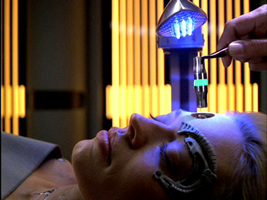
 "Imperfection"
"Imperfection"